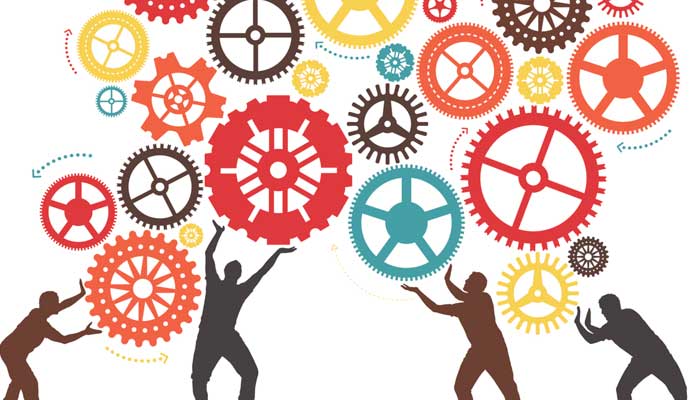How to balance power and love
Scenario planning and social change expert Adam Kahane suggests that to master large and difficult challenges, leaders need to learn to act and empathize simultaneously.
Adam Kahane’s book Power and Love: A Theory and Practice of Social Change (Berrett-Koehler, 2010) opens with a quote from one of Martin Luther King Jr.’s most famous speeches, his last presidential speech to the Southern Christian Leadership Conference. “Power without love,” said King, “is reckless and abusive, and love without power is sentimental and anemic.”
This is a concept that business leaders need to understand, because in times of crisis (and afterward), the people of an enterprise are put under a great deal of stress. Many people in major corporations today are still wondering if they will lose their jobs. A system that follows only the impulses of compassion and solidarity (which Kahane calls love) will lose its competitiveness; a system that follows only the impulses of resolve and purposefulness (which he calls power) will sacrifice its people heedlessly and risk its capability for growth and recovery. A mix of power and love, however, becomes a stance that a leader can hold, and this stance may, in the end, be the single most important factor in enabling a leader to accomplish great things.
Kahane is a partner in the small global consulting firm Reos Partners. He has a background in both business and the not-for-profit world, generally in leading multi-stakeholder groups as they work together on complex, intractable problems. For example, he has led projects involving warring Israeli and Palestinian factions, siloed organizations in the global food system, and antagonistic Canadian stakeholders wrestling with climate change. Originally trained as a physicist, economist, and energy policy expert, he worked for years at Royal Dutch Shell PLC’s renowned group planning department — the part of the company that developed much of the current-day practice of scenario planning. In 1991, Kahane was recruited to facilitate a seemingly quixotic conversation among 22 representatives of the diverse multiracial factions involved in the transition away from apartheid in South Africa: If they were going to make this epoch-defining move peacefully, how would they organize the economy? The storylines they developed are known today as the Mont Fleur Scenarios (named after the conference center in Cape Town where the discussions took place in 1991 and 1992). One of them, “flight of the flamingoes,” depicted all parts of the population gradually rising together in mutual economic advancement. This became a core theme of the economic policy of Nelson Mandela’s government. Kahane’s first book, Solving Tough Problems: An Open Way of Talking, Listening, and Creating New Realities (Berrett-Koehler, 2004), recounts the stories of Mont Fleur and other similar efforts around the world, both successes and failures.
Despite the success of his South African efforts, many participants at Mont Fleur, and in the discussions that followed, found the premise of basing policy on harmony naive. As one African National Congress leader put it, “The only birds that matter here are [not ostriches and flamingoes but] hawks and sparrows!” It turned out that love-oriented solutions are almost impossible to sustain in the predatory atmosphere of any political or competitive power structure. To really make change happen, you need to balance love and power. During the following years, Kahane came to recognize the tension underlying this reality, and to develop some ways to resolve it. That is the basis of the courses he teaches on social change — for example, at the Alia Institute’s annual summer Authentic Leadership in Action program, where he and I are both on the faculty. Kahane sat down with me at last year’s institute, in June 2010 in Halifax, Nova Scotia; he is repeating the course this summer, at the 2011 Alia Institute in Columbus, Ohio.
S+B: How does the basic dilemma between getting things done (power) and making better connections (love) play itself out in business?
KAHANE: It’s a universal and familiar phenomenon. Many people, consciously or unconsciously, make the mistake of choosing one or the other. Frances Westley, a professor of social innovation at the University of Waterloo, once asked David Culver, the CEO of Alcan, how he had earned his reputation as a great manager. He told her that when he was tempted to be tough, he tried to be compassionate, and when he felt inclined to be compassionate, he tried to be tough. Not many people understand how to keep those drives in such a dynamic balance.
S+B: Are you saying that most people gravitate toward either compassion or toughness?
KAHANE: I’d say 70 percent of the senior people — in business, government, and the nonprofit world — fall into either the power camp or the love camp. Those in the power camp think that compassion and empathy are soft emotions, that they don’t matter in the working world, and that they should be relegated to the home, family, and romance. They see the weak, degenerative side of love — which certainly exists.
But they fall into a trap. The exercise of power without love becomes reckless, abusive, and ultimately counterproductive and fragile. When businesspeople focus relentlessly on finishing the mission, getting on with the job, at the cost of their connection to employees, communities, or the environment, they lose their long-term legitimacy and viability. When I worked on regional development problems in Houston, I had a number of encounters with Ken Lay, then the CEO of Enron, and I saw firsthand the phenomenon of entrepreneurialism without responsibility. There are many Enrons, practicing power without love and suffering less-dramatic versions of the same fate.
But love without power is equally prevalent — and equally dangerous for people trying to accomplish something. It’s just not as widely understood.
S+B: Is it prevalent even in environments like business?
KAHANE: In most businesses, there’s a love camp containing the people who see and stand against the degenerative use of power. I’m often amazed at how many of them there are in companies, often trying to keep that side of themselves hidden. Not long ago, I asked an audience of human resources professionals in a South African bank where they would place themselves. I was surprised that 80 percent of them said they saw themselves in the love camp. I had not realized the extent to which different functions polarize themselves around either power or love — for example, with HR people seeing themselves as the holders of compassion, pushing back against the dominant power culture.
I was like that for several years myself after I became involved in social change work. My gender, age, and upbringing had made me originally more comfortable with power, but Solving Tough Problems was written with the enthusiasm of somebody who just discovered love. After it came out, Shambhala Sun publisher Jim Gimian said, “Adam, you seem to be down on force in this book. I think that’s a fundamental error. Don’t you realize nothing happens without it?”
More specifically, nothing happens without the dirty, nitty-gritty recognition that everyone in a complex problem situation is asking, “What’s in it for me?” I’ve made the mistake of overlooking those interests, and therefore getting stuck. At one tough workshop of South African leaders, my co-facilitator Ishmael Mkhabela turned to me and said: “Adam, [these attendees] are not nuns, they are not priests; they have not taken vows not to have interests. People’s interests are not the problem; it is only a problem when those of one overpower those of others.” We see the same issue come up in climate change work, and in any work on social governance; people try to make the conversation nonpartisan. But you’ve got to let everybody bring up their partisan interests openly, and see what you can do once you know what they are. You’re not just looking out for the good of the whole system. You have to attend to the parts as well, because that’s where the power — the ability to get things done — resides.
A number of people have observed that the worst conflicts about power tend to occur in idealistic organizations, such as those in the fields of healthcare and education. Maybe this is why. Just when you’re getting to the really tough issues, somebody stops everything by proclaiming, “remember the patients” or “remember the children.” That’s not helpful. Nobody had forgotten the patients and the children, but these statements obscure the necessary, difficult work of dealing with particular interests.
S+B: Why do people find it so difficult to keep both power and love in mind?
KAHANE: Because of deeply held beliefs. As a power person, I tend to hesitate to open myself up because I think if I do, I’ll get hurt. And I know a lot of people in the love camp who say, “Well, I don’t want to assert myself because I think I’ll hurt someone.”
A fair number of people — maybe 10 to 30 percent of those in a typical company — are skillful at both. Many of the people I admire balance the two imperatives, and all of us can become more conscious of it and consistent at it. Wendy Palmer, an aikido expert whom I met on the faculty at Alia, has a good way of thinking about this. “In a no-stress situation,” she says, “we can handle both power and love. But under stress, the power people revert to their comfort zone and become reckless and abusive, and the love people revert to theirs and become sentimental and anemic.” In one very high-stress project I facilitated, the Bhavishya Alliance addressing child malnutrition in India, I ended up being reckless and abusive on some days and sentimental and anemic on others. This was confusing to other people and an unhelpful leadership stance.
Organizations also have difficulties maintaining this balance. Aren’t there organizations that, under stress, revert to power or revert to love? Aren’t there societies that do the same? What’s the comfort zone of the social system?
S+B: Does an example come to mind of truly skillful practice?
KAHANE: Yes, there are many examples. They include leaders who are not afraid of power; who revel in it. But they also have allegiance to the common good, larger than their own interests or anyone else’s.
Martin Luther King Jr. was a preacher, but he spent 90 percent of his time on power questions — like figuring out the key people involved in a march, who should be positioned where, whom to pressure to do what. Betty Sue Flowers, the former director of Lyndon Baines Johnson’s library, introduced me to Robert Caro’s biography Master of the Senate [Knopf, 2002]. It’s the amazing story of the passage of civil rights legislation in the United States. Johnson understood power and compassion intimately. He could talk for hours about every single senator — his likes and dislikes, how to twist his arm, whether to call him at his wife’s or mistress’s house. He knew how to work with their interests. But he also never lost his drive to accomplish his goal of achieving civil rights legislation, a drive grounded in personal compassion and based in part on some early experiences with Hispanic schoolchildren. There were times when he grabbed people by their lapels in the Senate cloakroom and literally poked his fingers through their buttonholes to keep a hold on them so that he could make a point.
S+B: How does one become accomplished at this balance?
KAHANE: You have to deliberately practice both: power and love, power and love, like walking with your left foot and then your right, over and over.
Most business and political systems are characterized by an excess of power over love. There is too much fragmentation. So your first moves have to be love moves, to foster mutual connection and awareness. Bring together the farmers and environmentalists, the bankers and regulators, in some kind of dialogue that helps them see the interdependencies among them more clearly.
But you also need to make power moves. This is generally experienced as disruptive, because it goes against the grain. You have to learn to say, “Guys, it’s been nice talking with you, but now we have to do something, and here’s what I’m going to do.” One power move is to make special interests discussable — stop pretending they don’t exist.
Learn to recognize the places where you are stuck in one dynamic or the other. Typically, power-oriented players discover that their inattention to other players has produced opposition that they don’t even see at first. At Shell’s scenario sessions in the early 1990s, we never considered the difficulty of building production facilities close to indigenous communities in places like Alaska. We didn’t realize that our capacity in exploration and production would be literally blocked by our insufficient skill in engaging with these players. A little more attention to love — simply to seeing who was out there, and what they felt strongly about — would have helped us manage this much more effectively and inexpensively. Something similar is happening now with climate change. Many companies fear the introduction of restrictions on their power. They are missing an opportunity to find an underlying unity that could sustain them much more in the long run.
When British settlers arrived in Australia, they relied on a legal doctrine that referred to the land as terra nullius — land belonging to no one. This justified the ways that settlers could act, as if the aboriginal people didn’t exist. Then in 1992, the courts ruled that the land had in fact never been empty, and the descendants of settlers needed to deal with this fact. That was a move toward seeing the whole of the situation — toward love. But in many business contexts, we still assume that we’re living in an empty land, a terra nullius. But it’s not empty. It’s full of people from other cultures, or of other externalities that the power camp would prefer to ignore. As interdependence increases — and it’s increasing exponentially — we find out that neither power nor love can be ignored.![]()
Author profiles:
- Art Kleiner is the editor-in-chief of strategy+business and the author of The Age of Heretics (2nd ed., Jossey-Bass, 2008).





